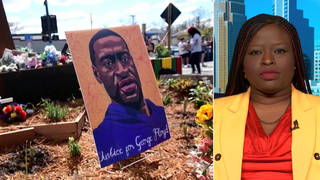
By Amy Goodman & Denis Moynihan
While the pandemic slows through the U.S. (at least among the vaccinated), another deadly epidemic persists unchecked: police killings of men of color. A Washington Post online database reports 7216 people killed by police since 2015, with 914 killed so far this year. African Americans are two to three times more likely than whites to be killed by police. A movement is growing to hold these violent officers accountable. Progress is being made, as demonstrated by developments in the cases of Ahmaud Arbery, Roger Greene, and Elijah McClain. Nothing will bring them back, but accountability may prevent future deaths at the hands of police.
“There is an arc of history that connects lynching’s past to policing’s present,” Khalil Gibran Muhammad wrote in his book, “The Condemnation of Blackness.” As devastatingly documented at the Legacy Museum and Memorial in Montgomery, Alabama, lynching was central to terrorizing the African American population following emancipation from slavery.
Ahmaud Arbery’s violent death on February 23rd, 2020, caught on video by one of the accused perpetrators, had all the hallmarks of those lynchings from a century ago. On that sunny Sunday afternoon in the suburbs of Brunswick, Georgia, Gregory McMichael and his son Travis McMichael saw Arbery jogging, grabbed guns and pursued him in a pickup truck. Their neighbor, William “Roddie” Bryan, joined the pursuit in his own truck, recording the video on a cell phone.
The McMichaels claim they were attempting a “citizen’s arrest” of Ahmaud Arbery, who rightly resisted. Travis McMichael fired two shots, killing Arbery. The elder McMichael was a former Glynn County police officer and investigator for the Brunswick Judicial Circuit prosecutor, Jackie Johnson. She was recently indicted for directing police not to arrest Travis McMichael, and then steering the case to a sympathetic prosecutor. It was a third prosecutor, after the video evidence became public, who ultimately filed the murder charges against the McMichaels and Bryan. Jury selection is currently underway in their trial.
In Louisiana, officers in a notoriously violent State Police division known as “Troop F” engaged in a high-speed pursuit of 49-year-old African American motorist Ronald Greene, on May 10th, 2019. Police reported that he died after crashing into a tree. They later said that he struggled with them, and that he died on the way to the hospital.
More than two years later, the Associated Press published shocking police body camera footage of the encounter that painted a drastically different picture. “I’m your brother! I’m scared! I’m scared!,” Greene was pleading as police brutally beat, tased and dragged him while shouting threats and expletives at him. Not long after, he was dead.
In a remarkable development, an African American Louisiana State Trooper, Carl Cavalier, went to the press last June, releasing notes from the officer who investigated the death. That officer had recommended that at least one of the troopers involved be arrested, and noted that senior State Trooper commanders intervened to block any arrests. Carl Cavalier, the whistleblower, has been suspended and reportedly has been fired, although the State Police say he’s still employed. As Cavalier told a Baton Rouge TV reporter, “We still have murderers, in my eyes, on the job.” Federal prosecutors are investigating the possible cover up, reportedly going up the chain of command.
Elijah McClain was violently arrested by police in Aurora, Colorado on August 24th, 2019. He was walking home from a convenience store, when police stopped him and quickly escalated the encounter. Police tackled him. “I can’t breathe. I can’t breathe, please,” Elijah pleaded. “I’m an introvert, and I’m different…I don’t even kill flies. I don’t eat meat. I’m a vegetarian.” An Emergency Medical Technician injected McClain with a massive dose of the sedative ketamine, causing a heart attack. He never regained consciousness, and died several days later. He was 23 years old.
His case went unnoticed until the racial reckoning following the police killing of George Floyd in May, 2020. Protests grew in Aurora, a Denver suburb. Colorado Governor Jared Polis empowered the state Attorney General to investigate, and in September, three police officers and two EMTs were charged with manslaughter, homicide and assault. This week, Aurora reached an undisclosed settlement with the McClain family.
A tectonic shift is underway in public awareness of the pervasiveness of police violence, especially directed at young Black men. There is also a growing willingness to prosecute police who kill. Yet, the George Floyd Justice in Policing Act died in the U.S. Senate, and just this week, the U.S. Supreme Court made it harder to hold police accountable with two opinions that strengthen the doctrine of “qualified immunity.” Despite the resistance of these powerful institutions, it will be an engaged citizenry, both documented and undocumented, that will end the epidemic of police killing.












Media Options